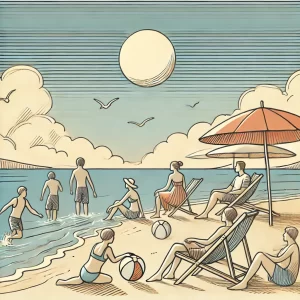恋のバカンス [Koi no Bakansu]
ザ・ピーナッツ [Za Pīnattsu]
Words : 岩谷時子 [IWATANI Tokiko]
Music : 宮川泰 [MIYAGAWA Hiroshi]
The Peanuts was a vocal duo from Nagoya wiki, consisting of twin sisters Emi and Yumi Ito. They were active internationally and even appeared on shows like The Ed Sullivan Show. They were also quite famous in East and West Germany as well as Italy at the time. Additionally, they were well-known for hosting music programs and appearing in the kaiju movie Mothra wiki. Incidentally, Emi was once married to Kenji Sawada.

“Koi no Bakansu” (or “Koi no Vacance”) is a song released in 1963. It became popular right after its release and was later covered by many singers. Furthermore, in 1965, it was a major hit in the Soviet Union when a popular singer there (Нина Васильевна) performed it in Russian (Каникулы любви / Песня о счастливой любви). The song is still well-known in Russia and former Soviet countries.
The lyrics were written by Tokiko Iwatani, who also wrote “Koi no Kisetsu” yesterday.
- 恋 [koi] : love, romance
- バカンス [bakansu] : vacation
The title is similar to “Koi no Kisetsu.” In this case, it might be easier to understand “koi” as meaning romance.
“バカンス / Bakansu” is a French word (vacances) meaning vacation. The word “bakansu” became a buzzword in Japan, partly due to the advertising campaign for a product called “Bakansu Look” released the same year. The word is still used today. Similarly, the Japanized term “バケーション / bakēshon” (=vacation) is used in a way that emphasizes leisure more than the original meaning. For the simple meaning of “vacation,” words like “休み / yasumi” or “休暇 / kyūka” are used in Japanese.

ため息の出るような
tameiki no deru yō na
あなたのくちづけに
anata no kuchizuke ni
- ため息(ためいき) [tameiki] : sigh
- 出る(でる) [deru] : come out, emerge
- あなた [anata] : you
- くちづけ [kuchizuke] : kiss
(translation) “A sigh comes out from your kiss.”
甘い恋を夢見る 乙女ごころよ
amai koi o yume miru otome gokoro yo
- 甘い(あまい) [amai] : sweet
- 夢見る(ゆめみる) [yume miru] : dream
- 乙女ごころ(おとめごころ) [otome gokoro] : maiden’s heart
(translation) “A maiden’s heart dreams of sweet love.”
金色に輝く 熱い砂の上で
kin’iro ni kagayaku atsui suna no ue de
裸で恋をしよう
hadaka de koi o shiyō
人魚のように
ningyo no yō ni
- 金色(きんいろ) [kin’iro] : golden
- 輝く(かがやく) [kagayaku] : shine
- 熱い(あつい) [atsui] : hot
- 砂(すな) [suna] : sand
- 上(うえ) [ue] : on
- 裸(はだか) [hadaka] : naked
- 人魚(にんぎょ) [ningyo] : mermaid
(translation) “On the hot, golden sand,
let’s love naked,
like mermaids.”
The phrase “金色に輝く” (=golden and shining) is particularly cool.
“Loving while naked” gives quite a bold impression. The mention of “naked” likely refers to an image of being on a beach. Just to clarify, “恋 / koi” does not carry the connotation of “make love”. Perhaps this reflects the Japanese image associated with “Vacance” or “Vacation”…?

陽にやけた ほほよせて
hi ni yaketa hoho yosete
ささやいた 約束は
sasayaita yakusoku wa
二人だけの 秘めごと
futari dake no himegoto
ためいきが 出ちゃう
tameiki ga dechau
- 日に焼ける(ひにやける) [hi ni yakeru] : sunburn
- 頬(ほほ・ほお) [hoho] : cheek
- 寄せる(よせる) [yoseru] : lean
- ささやく(ささやく) [sasayaku] : whisper
- 約束(やくそく) [yakusoku] : promise
- 二人(ふたり) [futari] : two people
- だけ [dake] : only
- 秘め事(ひめごと) [himegoto] : secret
(translation) “With sunburned cheeks pressed close,
the whispered promise,
is our secret,
a sigh escapes.”
The variation of the word “出る / deru” seen in “出ちゃう / dechau” is not something you often find in recent lyrics. It has a certain cute nuance to it.
ああ 恋のよろこびに
aa koi no yorokobi ni
バラ色の月日よ
bara iro no tsukihi yo
はじめて あなたを見た
hajimete anata o mita
恋のバカンス
koi no bakansu
- 喜び(よろこび) [yorokobi] : joy
- バラ色(ばらいろ) [bara iro] : rosy
- 月日(つきひ) [tsukihi] : days
- 初めて(はじめて) [hajimete] : first time
- 見る(みる) [miru] : see
(translation) “Ah, the joy of love,
rosy days,
when I first saw you,
Koi no Bakansu.”
The “ああ / aa” here is a filler.
“バラ色 / bara iro” is used in this context to metaphorically represent a state full of happiness and hope.
陽にやけた ほほよせて
hi ni yaketa hoho yosete
ささやいた 約束は
sasayaita yakusoku wa
二人だけの 秘めごと
futari dake no himegoto
ためいきが 出ちゃう
tameiki ga dechau
ああ 恋のよろこびに
aa koi no yorokobi ni
バラ色の月日よ
bara iro no tsukihi yo
はじめて あなたを見た
hajimete anata o mita
恋のバカンス
koi no bakansu
Among the 1960s songs I’ve covered so far, this one has a relatively large variety of vocabulary.
The music was composed by Hiroshi Miyagawa (note, it’s pronounced “Hiroshi,” not “Yasushi”), who is also known for his work on Space Battleship Yamato wiki. The music has a swing jazz feel, which was quite rare at the time. Many cover versions have a Latin-style arrangement.
The Peanuts’ harmonies are incredibly beautiful. I feel like singers from that era were very skilled. Tomorrow, I’ll introduce another female group with beautiful harmonies.
YouTube Search “Koi no Bakansu – The Peanuts”
Thanks for reading! Feel free to comment if you have any feedback or questions.
Follow me on X.



